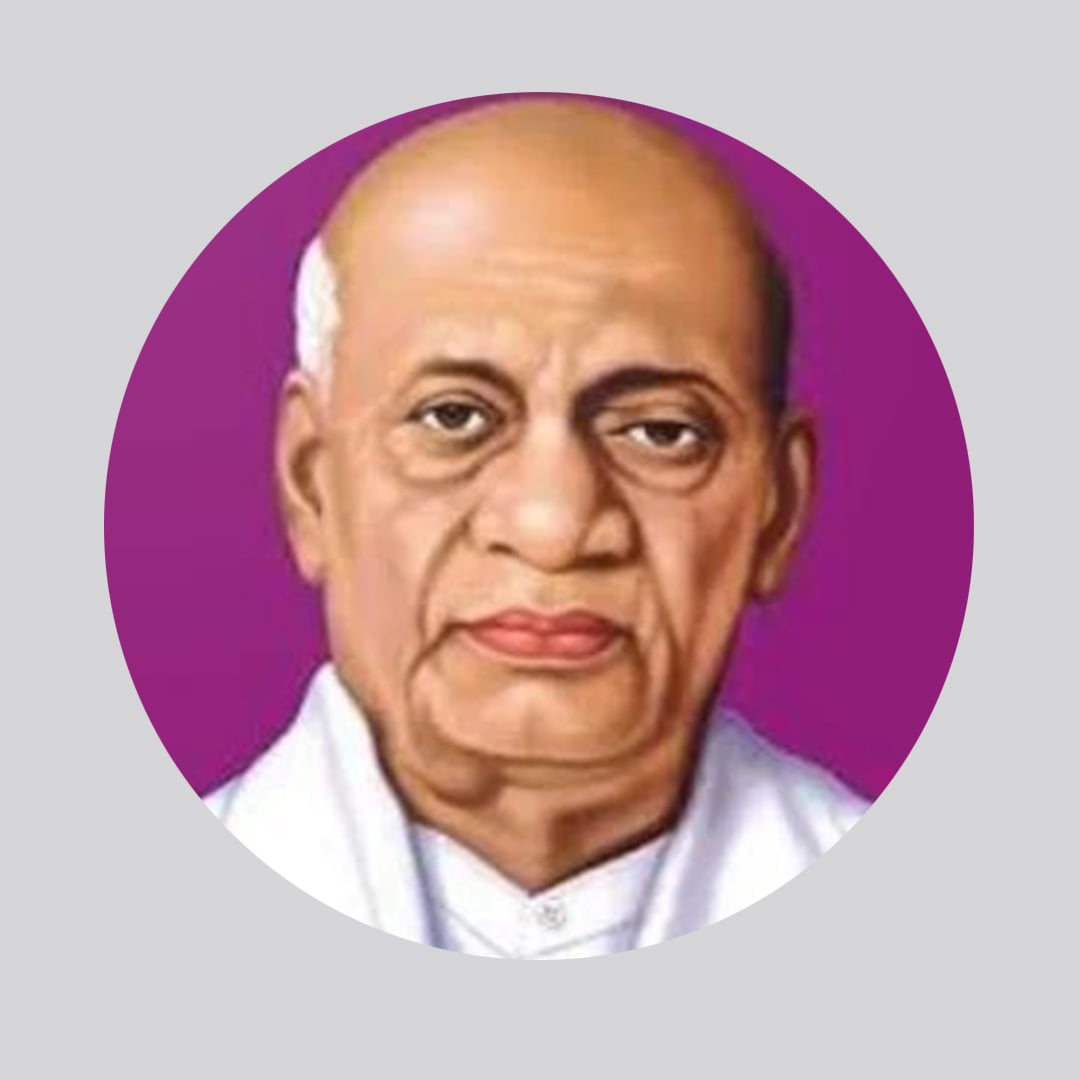Please enter the code we just sent to whatsapp 91-11-46710500 to proceed
Didn't Receive OTP?

A selfless leader, Iron Man of India, influential figure, successful lawyer, Unifier of India, Bismarck of India, Sardar and many more popular titles are attached to Sardar Vallabhbhai Patel. In India's freedom struggle of India, his role is incredible as he was a visionary and contributed a lot to the welfare of our country. Due to partition, India was on the verge of losing its geographical unity, but Sardar Patel's indomitable spirit and efforts made an impossible task possible. From being a prominent senior leader of the Indian National Congress, he later became free India's first deputy Prime Minister and Home Minister.
His leadership qualities, iron will and grit during the wake of partition earned him the reputation of being called "The Iron Man of India."
He was born in a farmer family on Oct 31st, 1873, in Nadiad Kheda district of Gujarat. At an early age, people took him to be ambitious less and suitable for a regular job. But in no time, Sardar Patel proved everyone wrong and cleared his law exams with unyielding determination. He didn't have enough money to buy books but had a firm resolve, so he used to borrow books and indulge in self-study.
After clearing his bar exam, he practised law at Godhra, Borsad and Anand in Gujarat. In 1911, he saved money and travelled to England to pursue his long-cherished dream of higher education in law. He performed exceedingly well in his course. Soon he returned to India and started practicing in Ahmedabad eventually became a successful barrister.
With a successful career, Sardar Patel was least interested in the freedom movement. The principles or ideologies of Mahatma Gandhi were least of his concerns. 1917, when he first met Mahatma Gandhi in Godhra, he went through a life-defining moment. From here on, Sardar Patel's life changed forever. Soon, he joined Congress and became Secretary of the Gujarat Sabha. In 1918, when Gandhiji urged him to join a tax exemption movement in Kheda, he left his high-paying job and chose the path of public service. During that time, Kheda faced plague & famine conditions.
In 1920, he shouldered the responsibilities of the Non-Cooperation Movement along with Gandhiji and travelled around West India. In 1923, in Nagpur, he led a Satyagraha movement for hoisting the Indian flag against the Britishers.
During the Bardoli Satyagraha in 1928, Vallabhbhai Patel earned the title of Sardar for his dedication and leadership qualities. He not only earned the respect and admiration of his contemporaries but even from the masses.
In 1930, during Salt Satyagraha, he was arrested and put on trial by the Britishers. He became the President of the National Congress in 1931 and delivered a sombre speech honouring the sentiments of the nation, witnessing the execution of Bhagat Singh, Sukhdev, and Rajguru. In 1942, during the Quit India Movement, Sardar Patel was arrested and was imprisoned till 1945 in Ahmednagar Fort.
Read more: Dr. Sarvepalli Radhakrishnan
He advocated for the protection of fundamental rights, civil liberties, and women empowerment for common people. He opposed against untouchability, alcohol consumption, caste discrimination, etc. Sardar Patel initiated addressing gender disparities and promoting gender equality in Gujarat and other parts of India.
Sardar Patel played a key role in integrating 565 princely states into the Indian Union, ensuring a united India. At that time, he was appointed Deputy Prime Minister and Home Minister and had health issues. Princely states like Travancore, Kashmir, Bhopal, Junagadh, and Hyderabad were not keen to join Independent India. But Iron Man of India was a skilled negotiator with persuasion and coercion, he persuaded the princely states to accede in India. He not only emphasized the benefits of joining the Indian union but also assured to preserve of their privileges and autonomy. Britishers were astonished to see his leadership and determination to safeguard the territorial integrity and sovereignty of the newly independent India.
Establishing and shaping the IAS (Indian Administrative Service) is one of the notable contributions of Sardar Patel. He not only restructured the administrative framework but named it the "Steel frame of India". Systemized bureaucracy or unified civil service for India proved to be a blessing even today.
The Advisory Committee on Fundamental Rights, Committee on Tribal, Minorities and Excluded Areas, and Provisional Constitution Committee are a few committees headed by Sardar Patel. He handled multiple portfolios as Home Minister, Information and Broadcasting Ministry, and Deputy Prime Minister, which contributed to the growth of Independent India.
Sardar Patel was 75 years old when he took his last breath on Dec 15th, 1950, in Mumbai.
Read more: Aryabhata and his role in Mathematics
Iron Man of India – for his immense contribution to ensuring the unity and integrity of India.
Bharat Ratan – In 1991, he was awarded the highest civilian award for his remarkable journey.
National Unity Day- In 2014, to commemorate the birth anniversary and contribution of Sardar Patel, the Indian government announced Rashtriya Ekta Diwas on Oct 31st every year.
Statue of Unity- On the occasion of his 143rd birth anniversary on Oct 31st, 2018, a statue of Sardar Patel was unveiled in Kevadia, Gujarat.
Sardar Sarovar Dam- The dam is built across the Narmada River in honour of Sardar Patel.
"Every citizen of India should remember that he is an Indian and he has every right in this country but with certain duties."
"Tell Churchill to save England before saving India."
"A war based on Satyagraha is always of two kinds. One is the war we wage against injustice, and the other we fight against our own weakness."
"My culture is agriculture."
Shape Your Kid's Future with Bambinos Classes | Bambinos.live India's No. 1 English Communication Platform For Kids | Book a Free Class Now